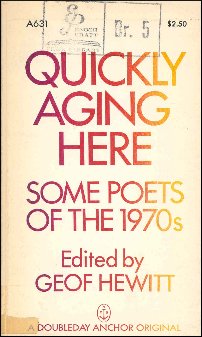Retrospective
Biographical Note
Age, 24. Born, Kendallville, Indiana. Moved soon after to Ocala, Florida and later Paducah, Kentucky, where my family lived most of my life. Attended Oberlin College: B.A. in English literature, 1968. Robert Ober and I shared the same house on and off while undergraduates, and I think I learned the most about writing from the explorations we were each making during that time and the discussions we had about them. Robert Bly also offered valuable criticism. My sister (who looks like Julie Christie) gave early encouragement to my interest in being an artist. The wood and lakes around my home contributed much to the sense of proportion I try to hold in mind toward most things that fascinate me. I could not have written recent poems without the presence of Kennette, who is wonderful and has shared everything.
Early poems were influenced by Robert Bly, James Wright, and Galway Kinnell. Recent work (written since the poems that were chosen for this book) has been influenced by Gary Snyder and James Koller, and bears little resemblance to the poems printed here. Formal poetics usually bore me. Intra-specific aggression exists between poets and anthologies of established poets read like ecological surveys: Black Mountain, San Francisco Renaissance, Sixties poets, and Kayak poets, academics East & West. With cross-breeding and in some cases cross-pollination. Poets of the generation of ’62 offered us the Apocalypse, filing two by two into the Surrealist Ark. The Eastern mind, symbolized by the drifting small boat, is hardly so categorical, divisive and desperate. A sense of Unity in all things replaces a sense or moral superiority. Political commitment need not rigidify poetic explorations. For these reasons I try to avoid being a poetician. Pablo Neruda wrote without theories, though this fact has been subverted into a rigid dogma of the image. Neruda kept himself free of literary polemic and adapted to the best explorations of each new generations of poets, most often exceeding their efforts. In American poetry, only the range of Gary Snyder’s attests to an equal energy and independence.
One late note: The half-time announcer at the 1969 Superbowl football game gave us this to consider: “The band will now execute the traditional designs and symbols of our national heritage.” As a one-man band, I try to accomplish the same thing in my poems. There is no nourishment in our present Daley bread.
© The Estate of Sandford Lyne
